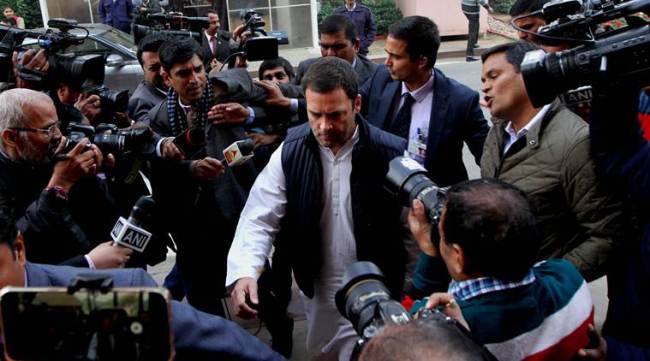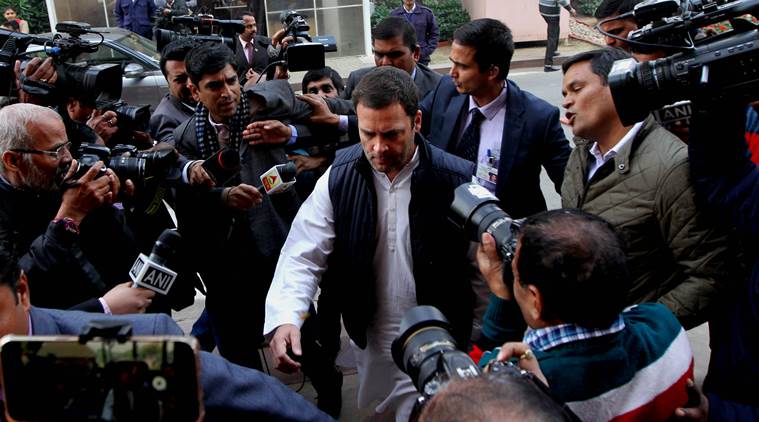Opinion Rahul Gandhi showed maturity by symbolically connecting with the Hindu majority
In UP, Punjab and now Gujarat, Rahul must have realised that the Prashant Kishores of the world are not even a patch on the politicians like Ahmed Patel, Ashok Gehlot and Amarinder Singh.
 Congress President Rahul Gandhi at the Parliament house in Delhi on Tuesday Express photo by Prem Nath Pandey 19 Dec 17
Congress President Rahul Gandhi at the Parliament house in Delhi on Tuesday Express photo by Prem Nath Pandey 19 Dec 17  Rahul managed to create the right political and social alliances overcoming the apparent conflict of interests amongst various social groups (Express Photo/Prem Nath Pandey)
Rahul managed to create the right political and social alliances overcoming the apparent conflict of interests amongst various social groups (Express Photo/Prem Nath Pandey)
The best “prediction” about the Gujarat polls was made by The Indian Express’ commentator Meghnad Desai, who said, “The BJP cannot win and the Congress cannot lose.” His point was that with all kinds of resources at its command, besides the famous ‘Modi magic’, even a minor loss would be a defeat for BJP; by the same logic, even a minor gain would be a victory for Congress.
The BJP is back in power in the state with roughly 12 per cent less votes than what it got in the Lok Sabha elections. On the other hand, the Congress added 9 per cent to its vote share, thus bringing down the difference between them from 26.6 per cent to 6.6 per cent. Besides the fact that the BJP has been brought down to under a 100 seats and the Congress to 77 seats, it seems that the Congress lost 16 seats with a margin of less than 3,000 votes. Most of these were courtesy the BSP — the self-proclaimed sole spokesperson of Dalits.
By any reckoning it is a creditable performance for the grand old party. Far from India becoming Congress-mukt, the PM’s home state seems to be giving him a warning loud and clear. Far from being dismissed as ‘Pappu’, Rahul Gandhi has emerged as a leader with determination and decency. He has earned the acceptability of a serious leader in the ‘fortress’ of Hindutva. He led from the front and showed no signs of his heart not being in politics. He managed to show Shankersinh Vaghela his place – the former Congressman who revolted has been made totally irrelevant.
Rahul managed to create the right political and social alliances overcoming the apparent conflict of interests amongst various social groups. Coming out of the influence of ‘management’ and NGO type mindsets, Rahul Gandhi wisely relied on experienced and clever politicians like Ashok Gehlot.
All this has energised Congress for upcoming electoral battles. The PM addressed 41 rallies in the state and went to the extent of virtually charging the former vice-president, the former PM and the former army chief of high treason by conspiring with Pakistan to defeat the BJP.
But the Congress also suffered from lack of organisation and local leadership, which reflected in most of its leading lights losing their seats. The Congress can certainly feel satisfied with its performance, but it would be foolish to be happy.
Direct or indirect communal polarisation has always been central to the BJP’s poll strategy as well as RSS vision. Under Narendra Modi this has reached such a pass that a large number of Hindus are willing to undergo any amount of hardship as long as Muslims are “kept in their place and occasionally taught a lesson or two.” Enhancing this sentiment and deftly using it at the politically opportune movemnt is central to BJP strategy. It is impossible to defeat this strategy without highlighting the crucial difference between the secular Hindu tradition and political Hindutva. In order to make minorities feel secure and to ensure their equal participation in the national project, it is essential for any political formation to enjoy the trust and support of the majority community. This is true not only of India, but of every society. Liberal values can only thrive when the majority is not hostile to them.
Rahul Gandhi showed great maturity on this front, when he moved in the direction of symbolically connecting with the majority community, sections of which had come to feel a distance from Congress.
In Himachal Pradesh as well, the difference between the two parties is not as great as most pollsters predicted. With the chief ministerial candidate Prem Kumar Dhumal having lost, someone close to Narendra Modi will now get the job. For Congress, the election was fought virtually single handedly by Virbhadra Singh. Maybe, in retrospect, Rahul Gandhi should regret the fact that he did not pay the required attention to this state.
The importance of Gujarat is that, coming within nine months after the Uttar Pradesh election in which the Congress performed terribly – and the BJP got more than 300 seats – the election in the home state of both the PM and the party president did not allow the BJP to step beyond the 100-seat “lakshman rekha.” Despite the fact that Gujarat’s traders seem to have forgiven Modi for the perils associated with demonetisation and GST. This should give the PM enough confidence to accelerate his favourite economic reforms, like FDI in retail, particularly in Gujarat.
For Congress, the factors of its success in Gujarat indicate the future direction it needs to take. Most importantly, it must consciously reclaim the nationalism space. It must highlight and project the inclusive, sensitive, justice- oriented and democratic Indian nationalism which is the real legacy of our freedom struggle.
Gujarat has also shown the limits of the Modi magic. Congress must build up on it, and continue forming alliances with relevant social groups. Within its own organisation, it must encourage regional leadership. In UP, Punjab and now Gujarat, Rahul must have realised that the Prashant Kishores of the world are not even a patch on the politicians like Ahmed Patel, Ashok Gehlot and Amarinder Singh. Congress as an Opposition party needs to strategically choose the issues to agitate.
To begin with, the Congress must seriously take up, within Parliament and outside, the issue of the PM’s reprehensible allegations against the former vice-president, the former Prime Minister and the former army chief. Apart from energising Congress further, this will also contribute to common political good by making people in high positions realise the responsibility that comes with high position.






